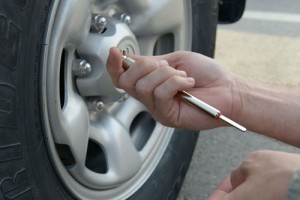 Proper tire pressure is more important than some people realize. Over ninety per cent of a vehicle’s weight is supported by the air in the tires. Since the tires are the only part of the automobile that has contact with the road, maintaining them is not only important to your wallet, but to your safety as well.Even if your car receives regular maintenance checks at a service garage, you as the driver of the vehicle need to take responsibility to keep your vehicle running optimally and at the top of your list should be checking the air pressure in your tires.
Proper tire pressure is more important than some people realize. Over ninety per cent of a vehicle’s weight is supported by the air in the tires. Since the tires are the only part of the automobile that has contact with the road, maintaining them is not only important to your wallet, but to your safety as well.Even if your car receives regular maintenance checks at a service garage, you as the driver of the vehicle need to take responsibility to keep your vehicle running optimally and at the top of your list should be checking the air pressure in your tires.
Underinflated Tires:
- bend more as they roll, increasing the amount of fuel needed to move your vehicle.
- reduce the life of tire tread.
- can cause a loss in handling, steering and cornering as well as poor or delayed braking.
- create more heat than properly inflated tires, which could lead to tire failure and ‘blow outs’.
Overinflated Tires:
- can also reduce your vehicles handling.
- decrease the lifespan of your tread.
- reduces the comfort of your drive because the tires are too stiff, which makes it more difficult for your tire to absorb impacts from the road.
- will make holes, bumps and debris on the road felt more and may lead to a spike in pressure that could increase the chance of a blowout.
Even if your vehicle has a tire pressure monitoring system, you should still check your tire pressure regularly. Some systems only notify you when your tire is significantly under inflated and a safety hazard. You should consult your owner’s manual for more information on your system.
Improper inflation is only one enemy, tires also lose air naturally over time. Changes in the outside temperature also effect your tire pressure.
The best thing to do is to regularly look over your tires and check your tire pressure. You may want to make it a habit to do so when you fill up at the service station.
The few minutes it takes to check your tires every week more than makes up for time spent with increased safety, savings and peace of mind.




